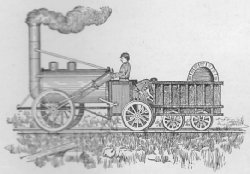|
The locomotive engineer and the train dispatcher hold the two most responsible positions on the railroad. The former clings to the throttle, while the latter sits before a train sheet in the dispatcher's office and regulates the running of the train on which the engineer sits in the cab, with his eye straight ahead. To become an engineer, one must previously pass through a regular course of instruction. First, the apprentice who seeks to become an engineer goes to the master mechanic of the "division" and makes application for work. He is then placed in the roundhouse as a wiper. This duty consists in cleaning the engines as they come in. His salary ranges from $1.10 to $1.25 per day. If the applicant shows ability, he is soon promoted to the task of "firing" engines. The next step is when the young "stoker," as he is sometimes called, is placed on a switch engine in the yard, to act as extra fireman. In this capacity he may remain for several months; in fact, some serve from one to three years in the yard before they are permitted to run upon the road. After a time, however, the novice becomes proficient enough to be given a trial on the road, under the watchful eye of a pilot. When one or two trips have been made in this way the fireman becomes a full-fledged knight of the scoop, and begins to draw a fireman's pay, which averages about $3.25 per hundred miles. The duty of a fireman is to keep up sufficient steam with which to run the engine, to keep a sharp lookout, when not otherwise engaged, for all track obstructions, and to ring the bell and take signals from the train crew. In addition to this, he is expected to keep his locomotive in splendid condition, and not infrequently does he clean the entire "jacket" every trip. The work is hard and hazardous. A broken rail may, without warning, cause a wreck and kill the fireman. Despite the dangers attached to this position, hundreds of applicants are ready to accept it when offered. In cities, stationary engineers are usually paid by the day, their salaries ranging from $3.25 to $4.50 per day. There are schools where engineering is taught, but the most successful engineers are those who have learned their trade by active service under an old fireman or engineer. The stationary engineer also serves as fireman, unless it be where the engine and boiler are too large, in which case a fireman and an engineer are employed. When the fireman has run upon the road a certain length of time, he is promoted to be engineer of a switch engine, doing duty in the "yards." Here he remains for, at least, one or two years before he is placed upon the road in charge of an engine. His first trips as engineer are under the direction of an old engineer, who acts as his pilot, and who teaches him the road in order that he may know the grades, the crossings where whistles are to be blown, and obtain any information that is necessary. Then comes the time when he makes his first trip alone. That is a happy moment to the ambitious engineer. With his promotion comes a nice increase in salary he draws "freight-engineer" rates, which are about $4 per hundred miles. After a time, he is placed upon a passenger train, where, also, be gets an increase in salary, but at the same time, incurs more responsibility and more danger. A successful engineer averages about $160 per month. A DAY ON THE LOCOMOTIVE WITH THE FIREMAN
Many railroad companies require, on the part of their firemen, a good common-school education, and subject them to an examination in certain branches. When the fireman is about to make his regular trip, he reports at the roundhouse, draws the necessary supplies, and sees that the lubricators, lamps, oil cans, tank and sand boxes are filled. If he uses soft coal be sees that it is broken and wet down; that the cab and its fittings are wiped, the ashpan cleaned, and that the grates are straight to keep the coal from dropping through. He then compares his watch with that of the engineer. There are two systems of firing. In the banking system, used with coal having few clinkers, a large quantity of coal is placed in the rear of the firebox, so that the gases and hydro-carbons may be expelled and the coal may become coke. This is little used. The spreading system requires that the coal be broken into pieces about the size of a large apple. In starting, the fireman sees that the coal is well ignited, so that he need not open the firebox door until the train has gained considerable headway, and the lever has been hooked up, with consequent lighter pull from the exhaust. In approaching a stopping point, he shuts down the dampers, and if fresh coal has been recently applied he opens the blower and leaves the firebox door slightly ajar, to prevent the escape of smoke and gases. The fireman is the engineer's assistant, and is liable in an emergency to assume the latter's duties, or to take charge of another engine. To a considerable extent, it has been the usage among railway systems to allow engineers to select their own firemen, as it is important that these two trainmen shall be on the best of terms. The selection is subject, however, in a general way, to the assent of the master mechanic. The work, of an engineer and fireman is difficult and dangerous, and requires keen vigilance, close assiduity and iron nerve. TRAVEL BY NIGHT |
